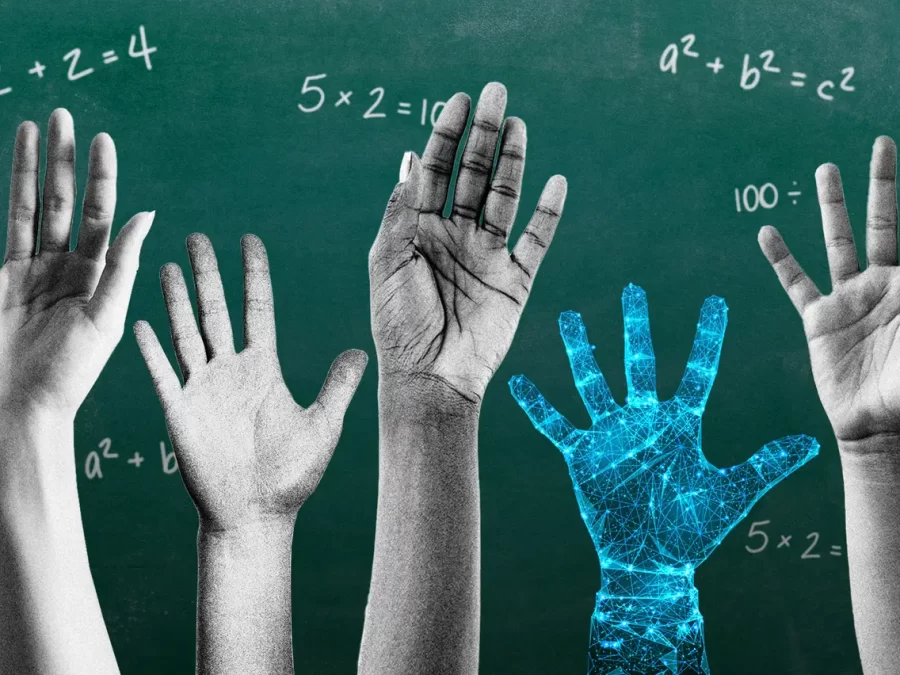Artificial Intelligence Taking Over Classrooms
The field of Artificial Intelligence (AI) is evolving so quickly that nearly every industry is being impacted seemingly overnight. The effect on AI on Education in particular, from K-12 through adult learning, has been written about for years, but has officially gone mainstream as instructors and learners everywhere now have access to the technology for free via ChatGPT.
“I’m fairly new to the school system but from what I’ve seen already, it seems that a lot of students are using AI as a means to complete their assignments like homework/projects,” said Computer Science teacher Jonathan Conaty.
Since ChatGPT became publicly available to anyone in November 2022, it has been adopted faster than any other software tool in history, with over 100 million users to date. With this viral growth, the tool began to permeate households and classrooms almost immediately with students using the tool to answer difficult homework questions and take home tests in a way that would have taken hours of research using Google Search in the past.
“I have used AI in school to assist me with assignments and problems that I either couldn’t find online or wasn’t able to ask my teacher about,” said senior Shang Oviedoluna. “I would mostly use it for ideas when I was struggling with creativity and for simplified explanations of math.”
Since the AI tool is generative, with a few well-crafted prompts and some background information, you can ask it to write an essay or a book report, and it will generate unique written content within schools. However, teachers’ concerns of cheating are at the top of their minds.
“I don’t think students using chatbots for their assignments is beneficial to their overall education. A lot of chatbots will do all of the work for them, inhibiting them from learning the actual material,” Conaty said.
However, the main takeaway for educators is that we can’t stop students from using these tools because they are transformative to learning, and learning how to implement them in classroom and spend time getting comfortable with the capabilities of tools like ChatGPT to provide specific guidance to students about how they should use them when doing their work.
“I have not used AI in school, but I have used it at home and I do use it to get ideas and “how to” to help me with assignments and essays,” said junior Yu Huang. “But I have never copied and pasted stuff from ChatGPT.”
AI should help students better understand how to craft compelling essays or answers to homework questions so they can spend their time doing more creative complex thinking. Education needs to be reformed and AI, like ChatGPT, helps even teachers to get ideas on assignments and different tasks.
“I have used AI before, specifically ChatGPT. I more so tested it out to get an idea of how powerful it was and what types of tasks it could complete. It did help me with perfecting some code I was working on, which was definitely beneficial,” Conaty said.
AI will likely impact almost every field from healthcare, to film. Throughout human history, whether it was different revolutions or the invention of the internet and even google, the development of new processes and technology certainly reshaped the world, destroyed hobs that were based on older inefficient ways of doing things, and created new jobs that were unimaginable before. Along the way there were fears that technology would make people lose purpose.
“AI does have a lot of advantages, like streamlining and automation of repetitive tasks. Disadvantages would be the lack of human emotion, potential human job loss, and using it to cheat on assignments,” Conaty said.
However, technology tends to do is make humans even more ambitious than they were before, and enable them to reach those ambitions faster, people want to be useful and inventive and odds are, that the biggest impact of AI on education will be an exponential impact on how quickly we can learn, and an ability to apply that learning to change not only our lives, but also education.
“I love AI, I think this is a positive step towards the future, and it should be appreciated. The stigma from how AI is bad all comes from movies which are unrealistic. There are huge advantages in AI, it allows us to do tasks faster and more efficiently,” Huang said.
Chatbots, like ChatGPT, will continue to be used by 100 millions of users, and there is no stopping anytime soon. ChatGPT allows both students and teachers to focus on critical-thinking and clinical judgment skills. The major call, in the face of these new developments, is for higher education to be ready and prepared for these major changes.







